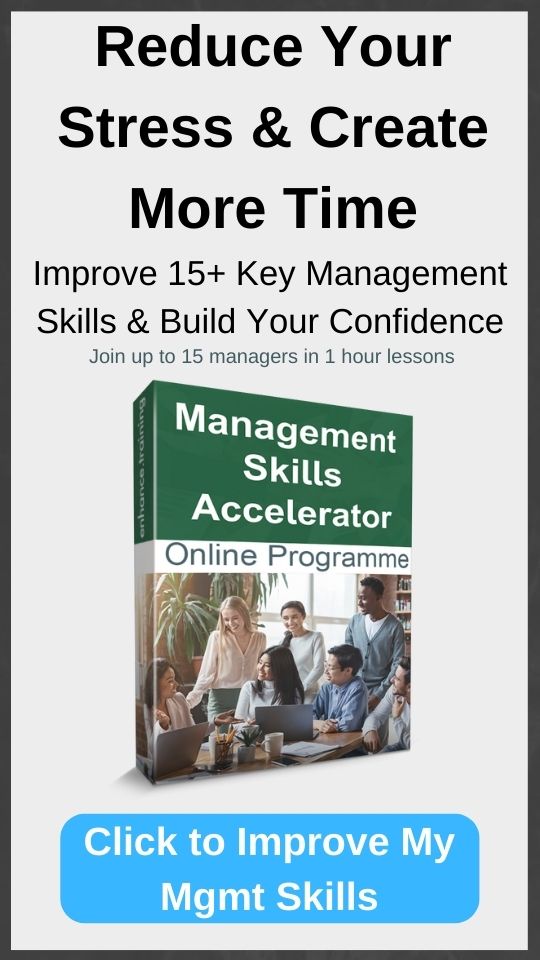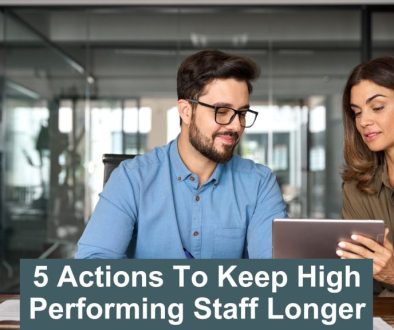6 Tactics to Deal with Pressure at Work

Pressure at work is next to impossible to avoid, not matter what job you do. Therefore learning how to deal with pressure at work is a pretty sensible skill set to develop -for example to know when you are comfortable with the level of pressure and when the stress gets too much and starts exhausting you or worse.
Your ability to productively manage pressure is as important to your career progress as developing many other more obvious skills. Managing stress productively will also make your work life a lot more enjoyable.
This Article Covers:
- Know Your Pressure Threshold
- Prioritise Ruthlessly
- Turn Big Tasks into Small Tasks
- Set Boundaries & Be Clear On Expectations
- How & When to Ask for Help
- 9 Pressure Management Techniques
Watch on YouTube
Listen on Podcast
Some pressure is needed in daily life – it is motivational and increases what we get done. Too much stress and pressure can leave you exhausted or worse. It is important to know where you are on the stress – performance curve.
Deal with pressure at work: Know your Pressure Threshold
Everyone has different pressure thresholds. Enjoyable pressure at work for one person might be debilitating pressure for another.
There are several traits that help us cope with stress. Having good self-awareness and emotional intelligence help. Being a resilient person helps. Getting to know yourself better helps you develop each of these and it helps you understand your own pressure threshold.
Knowing your pressure threshold allows you to manage yourself better, to enable you to be cool-headed more often and less emotionally reactive – which can be draining.
There are many ways to get to know yourself a little better – to develop better self-awareness.
- Ask trusted colleagues for feedback on your performance under different levels of pressure. What do they notice? How does your performance and behaviour change? It is worth finding out.
- Ask friends and family the same questions. There are plenty of pressurised situations outside work too.
- Spend time reflecting on your emotional reactions to different situations. How can you change your mindset to lower these reactions?
- Take personality tests – which do give you valuable insights to yourself
- Undertake 360 Degree feedback exercises usually organised through HR or external parties
- Get a mentor or a coach – which are both brilliant ways to find out more about yourself
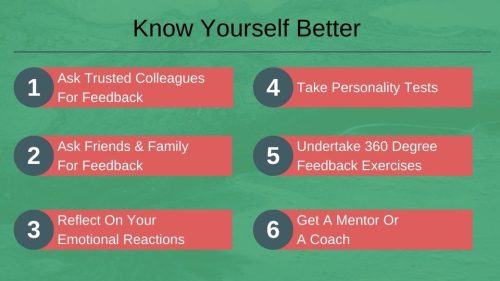
As you get to know yourself better, you should become better a recognising the situations and actions that increase the pressure you feel at work. Knowing what is happening gives you a better opportunity to develop coping tactics to reduce the pressure or stress you feel. Start using these tactics well before the pressure levels become too much.
Know your own pressure thresholds and what causes you to feel under pressure at work.
Deal with pressure at work: Prioritise Ruthlessly
Many feel under pressure when the tasks and projects you need to do – mount up and you just don’t have the time to do them all. I certainly feel pressurised in these situations. In the endless drive of companies to do more with less, we all face this situation.
Here are a couple of tactics that can help you prioritise.
Firstly, create a two by two quadrant with the urgency of tasks on one axis and the importance of tasks on the other axis.
You can then group all the tasks on your list into one of the 4 boxes.
- The important and urgent tasks should be the first you tackle and complete
- The important but not urgent tasks should be diarised, so you make sure you get to these and spend enough time and energy delivering them
- The urgent but not important tasks – look to delegate as many as you can, and do them after the important tasks have been completed.
- The not urgent and unimportant tasks – see if you can simply not do them or delegate them.
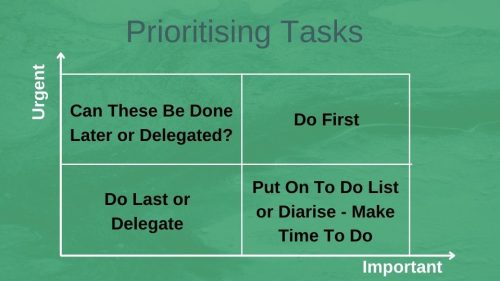
Another key discipline to reduce pressure at work is to prioritise your tasks. Select the most important and urgent task and then work on completing this before doing anything else.
Once the task at the top is completed, move on the next most important and urgent task. Keep on moving down the list once each current task is completed.
I know this sounds easy – it is until the task at the top is one you don’t like doing and more interesting tasks are available further down your priority list. Keep the main thing the main thing. Don’t allow yourself to get distracted.
Ruthlessly prioritise your tasks and complete a task before moving on to the next task.
Deal with pressure at work: Turn Big Tasks into Small Tasks
I am sure everyone has been given a project or a task that looks a nightmare or appears really hard or you have no idea where to start. Your mind seizes up with panic and the pressure levels rise.
Take a big breath and start thinking about the next step you could take on the journey to achieving the goal you been given. Think small. Think about what is actionable quickly.
Breaking down a big task into a lot of small tasks is mentally a lifesaver. Mentally, a speed bump is much easier to get over than a big hill. The pressure you feel will reduce as a result, you can think more clearly and start taking useful action.
For example, you need change a process that is not working well and costing the company thousands a day. The first step might be establishing and documenting exactly what the current process is. This is a much more straightforward small step to take and is entirely within your control.
Do this step and you gain confidence and a better understanding of the problem. The next step might be to understand what is going wrong or why we are losing money. Again a manageable step you can take to deepen understanding. Then you can start looking at options to improve the process.
Whenever you come across a sizable project or task, break this down into bite sized tasks. Aim to identify the first sensible step and take it. Then take the next small step. Before you know it, you will be well on your way to completing the main goal and confident about doing so successfully.
Turn big tasks into lots of small tasks.
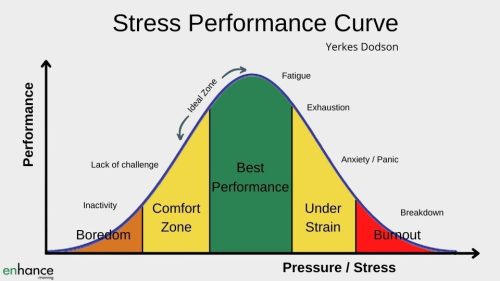
Deal with pressure at work: Set Boundaries and be clear on expectations
In today’s world of hybrid working and working from home, the boundaries between work and relaxing time are even more blurred than before.
Set personal boundaries so you allow yourself to switch off and relax. This could be a going for a gym class after work each night. Or meeting friends or doing activities that are not work related on certain nights of the week.
Set boundaries that give you down time, that get you away from work – mentally and physically. Giving yourself time to recharge will mean when you are at work you have more energy, more drive and more mental space to deal with the challenges.
Just as important is to find out exactly what the expectations are on you from your manager, from team members and from stakeholders.
A lot of pressure is created from simply not knowing or having unclear expectations. If expectations are unrealistic, then you can work to make them realistic with the person placing those expectations on you.
Deal with pressure at work: How & When to Ask for Help
When the pressures are too high or they are rapidly heading that way, then asking for help is a very sensible tactic. Who to ask for help will depend on your circumstances, the strength of your relationships at work and the company culture. I appreciate that asking for help in some organisations can have career impacting consequences.
There are many people you can ask for help from – inside and outside of your work. Work out who is best able to help you with your situation. Even just being able to talk about what is happening can reduce the pressure and stress you are feeling.
Here are people you should consider asking for help
Speak to your manager. You Manager should be first person you speak to about the pressures you are under. Ask for their help to reduce the pressure at work or at least stop it increasing. Your manager is also best placed to help you in most organisations. Providing help and support should be a very important part of their role.
Ask colleagues for help. Colleagues your trust or who owe you favours should be another source of help and support. Ask them to help you out. Offer to repay the favour in the future.
Ask your peers. If you are friendly with one or more of your peers, they can be excellent sources of help and advice. They are in a similar position to you and probably understand pretty well the pressures you are under. They may have very useful solutions to share that have worked for them.
Ask contacts outside of work. Having a business network outside of work is a great source of help and support. Getting help from your network will not impact your career negatively and is a lot safer than asking people in work. The downside is they can only indirectly help you reduce the pressure at work.
Find a mentor or coach. Mentors and coaches can both be excellent sources of help and support for your personal situation. Both routes provide confidential support and help, even if your company is paying for them.
There are other options. If you feel the pressures at work are getting too much, take action and get help as early as possible. Leaving it too late does not help you professionally or personally.
Deal with pressure at work: 9 Pressure Management Techniques
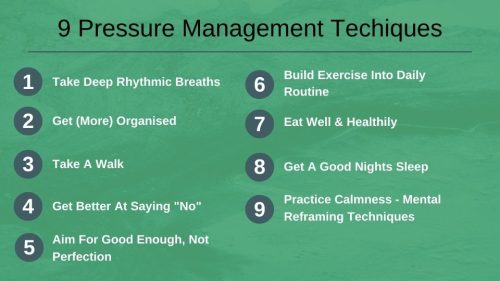
Keeping pressure and stress to manageable level is good news for you and those working around you.
Here are 9 pressure management techniques that work for many. Try all of them and see which combination works best for you.
- Take Deep breaths – more oxygen into your body is calming and taking deep rhythmic breaths is easy to do in nearly any situation. Make use of this technique.
- Get organised. Organising gives you a sense of control and a plan of action. These alone are good to calm you down and reduce the pressure. I get super organised as the pressure rises. It really works.
- Take a walk around the block. This is one of my favourites and walking is very good to calm you down. Steve Jobs was a famous user of this technique. Pop out for 5 -10 minutes to take a short walk.
- Get better at saying no. Say no to more work. Say no to popping into that extra meeting. Don’t say no, say “I am very sorry – I am maxed out with X project and I don’t have any additional time until next Wednesday. Can we talk about it then?”
- Do the work to a good enough standard, perfection is not needed. When you know exactly what is expected of you from your boss and others, it is much easier to meet those expectations without going too far beyond them. Don’t aim for perfection. Aim for good enough, particularly when you are under pressure.
- Build Exercise into your daily routine. Taking regular exercise helps reduce the pressure you feel, makes you feel healthier, stronger and gives you more energy. All good reasons to make 30 minutes or more of exercise a day part of your routine.
- Eat well. A demanding job takes up a lot of your energy. Your food gives you energy. The better your diet, the more energy you have. So eat well and eat healthy. You will have more energy to tackle the causes of the stress and pressure at work.
- A good night’s sleep cures a lot. When you are under pressure it is tempting to work very late. All the screen time, stress and pressure can easily reduce the hours you sleep. A vicious circle develops. Do your absolute best to get a good night’s sleep. You will think more clearly, have more energy and be more productive.
- Practice calmness. Be mindful of your own emotional reactions to situations. Practice reframing your mindset when confronted with these situations so you manage your emotional reactions better. A simple example – think of successfully overcoming the exciting challenge rather than dreading work involved
Dealing with pressure at work is a skill that each of us need to build regardless of what job we do. How we each deal with pressure needs to be tailored to our own personality and attributes. We each have our own pressure thresholds and getting to know these and the signs we are heading towards these thresholds is a very important step.
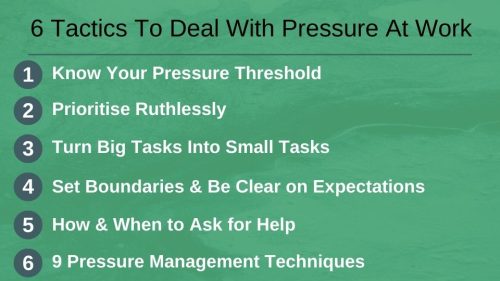

Dealing with pressure at work can be really tough and working out your coping mechanisms takes some time. I hope that the advice provided in this article speeds that process up considerably.
Some pressure is good – it gets us up and moving and is motivational.
The pressure at work can push us over the top of the stress performance curve and if this is you, reducing the pressure you feel is a must. I have been there and staying in a overly pressurised evironment is not healthy!
If you’ve found this article useful please share it on social media and with friends.


